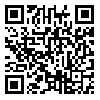BibTeX | RIS | EndNote | Medlars | ProCite | Reference Manager | RefWorks
Send citation to:
URL: http://ijpcp.iums.ac.ir/article-1-826-en.html
Abstract
Objectives: The purpose of the present study was to identify some potential predictors of obsessive-compulsive symptoms. In this study, the correlations of cognitive (responsibility, perfectionism), temperamental (behavioral inhibition), and emotional (anxiety, depression, stress) components with obsessive-compulsive symptoms were examined. Method: In a correlation study, 400 students from
Conclusion: Except cognitive and behavioral components, the correlation of behavioral inhibition with obsessive-compulsive symptoms was also confirmed.
Received: 2009/12/1 | Published: 2009/12/15
| Rights and permissions | |
 |
This work is licensed under a Creative Commons Attribution-NonCommercial 4.0 International License. |



